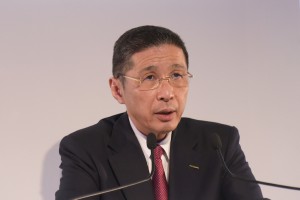The Japanese government played a central role in the breakdown of merger talks between Fiat Chrysler Automobiles and Group Renault earlier this month, according to a report by the Bloomberg news service.
The agreement, proposed by FCA last month, was widely expected to win the approval of the Renault board at a meeting in Paris on June 6, but even as the two companies prepared a joint announcement, things unexpectedly fell apart. Sources close to the negotiations previously told TheDetroitBureau.com that Fiat Chrysler decided to withdraw its offer after the French government, Renault’s lead shareholder, called for a week’s delay.
The new Bloomberg report fleshes out the details, indicating that French government officials were reacting to the “misgivings” of their Japanese counterparts who thought the merger “could harm Nissan,” Renault’s long-time Alliance partner.
TheDetroitBureau.com has reached out to its own sources for comment but has yet to confirm the new report.
(Click Here for our initial, inside report on the FCA-Renault deal’s collapse.)
Even as the Renault board met to begin discussing the specifics of FCA’s proposed “merger-of-equals,” it was known that Nissan itself had raised some concerns. The Japanese automaker’s relationship with Renault had already been seriously strained by the arrest last November of Carlos Ghosn, the man who put the alliance together in 1999 as part of the French automaker’s bailout of then-floundering Nissan. Ghosn has been accused of numerous acts of financial corruption, but it has been widely reported that the decision to prosecute him was part of Nissan’s pushback over Renault’s lopsided control.
According to Bloomberg, “Tensions escalated further when Renault’s new chairman, Jean-Dominique Senard, pressed Nissan for a merger it didn’t want, then pursued the Fiat deal without telling the Japanese company.”
(Renault, Nissan announce partnership with Waymo. Click Here for the latest.)
Several senior insiders at Fiat Chrysler have told TheDetroitBureau.com that FCA tried to ease Nissan’s concerns, knowing the potential damage that could occur were the Renault-Nissan-Mitsubishi Alliance were to break up. One of the benefits the Italian-American company hoped for by the merger was access to Nissan’s battery and autonomous vehicle technologies. But at least some Nissan executives, as well as the Japanese government, bridled at the idea.
Going into the June 5 meeting, the FCA side thought it had assuaged the Japanese automaker’s concerns. Significantly, as the Renault board meeting stretched into a second day, Nissan decided to abstain, rather than voting against the FCA-Renault merger, TheDetroitBureau reported two weeks ago. The only “no” vote came from the union representing Renault’s French employees, a position that had been widely anticipated.
By early evening Paris time on June 6, FCA and Renault were preparing an agreement indicating they would move forward to complete their merger. But two hours later, everything came crashing down. Advised that the French government was calling for a delay of up to a week while representatives flew to Japan, FCA withdrew its offer.
(Renault merger dead, FCA finds alternate way to add EVs to line-up. Click Here for the report.)
The Bloomberg report indicates that objections, not just by Nissan but also the Japanese government, presented “obstacles to a quick resumption” of the talks.
The Bloomberg report does not indicate precisely how the Japanese government helped scuttle the merger. It indicates that Nissan itself did not ask for any intervention. For his part, the wire service reported, “French Finance Minister Bruno Le Maire has said that Nissan’s plan to abstain on the Renault-Fiat vote drove his decision to seek a delay.”
While a source at FCA has told TheDetroitBureau.com it would “never say never” to resuming merger talks, that possibility currently seems unlikely. At the same time, Renault and Nissan both have been reported to be trying to patch up their own differences. But exactly where that goes is uncertain. The French automaker is still pressing the idea of a takeover of its Asian partner while Nissan and the Japanese government still want to gain more power in an alliance that would treat them more as equal, albeit independent, companies.




I believe this is best for all. I would not want to be tied to Nissan in any way-shape-form, considering the goings-on. It is obvious they want to be in control yet be able to pull monies and resources from their “sister” companies.
And with Senard seemingly going behind Nissan’s back and moving forward with talks I wouldn’t be surprised of talks to move him out. If this is true he cannot save face on the action, even if it had gone through and was successful.